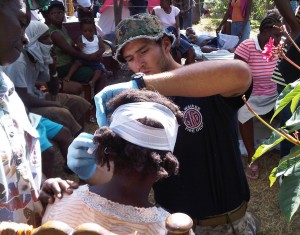
By Mira Dalal
UJW Staff
BETHESDA, Md. – Despite recent concerns about insufficient insurance coverage, area volunteers are still traveling to Haiti following the Jan. 12 earthquake in the capital Port-au-Prince to assist in an effort to rebuild and revitalize the devastated country.
In light of the 7.0-magnitude earthquake, volunteer groups have had to find ways around the difficulties of acquiring adequate insurance for their volunteers.
Some organizations such as UNICEF and the Global Volunteer Network provide extensive insurance coverage to their volunteers, yet others, like the Foundation for Peace (FFP), are running biweekly trips to Haiti without insurance coverage. Instead, volunteers must sign a safety waiver.
In addition to sending volunteers, FFP has worked to fill three semi-truck trailers with supplies, according to Kenneth Culver, president of FFP.
Prior to the earthquake, during the last two weeks of June 2009, 15-year-old Grace Chandler traveled to Haiti with her church, in partnership with FFP.
“When I went, there was a ton of paperwork and insurance stuff,” Chandler said. “So now, after the earthquake, I’m sure the amount of paperwork has skyrocketed.”
However, the culture and climate intrigued Chandler enough to make her decide to travel back to the ravaged country next summer as well.
“Here, at home, I feel like we always want something more, but (the Haitians) are happy with what they have, even though they have nothing,” she said.
The earthquake, in Chandler’s mind, has reestablished Haiti as a destitute country that desperately needs international aid.
“From what I’ve seen in pictures, there’s nothing left, it’s flat,” she said.
Part of the difficulties lay in the catastrophic loss of human life.
According to the U.S. Geological Survey, the most recent death toll is around 230,000, creating an urgent situation that cries out for volunteers.
However, the U.S. State Department Web site, updated after the earthquake, “strongly urges U.S. citizens to avoid travel to Haiti.”
Aside from the obvious concern for volunteers’ safety, Culver holds the same optimism as many Haitians do – that something can be done to resurrect the ravaged country.
“For those who were killed or maimed, no, [the attention] won’t be a consolation,” Culver said. “But it may lead to a better government system and more stability for this country.”
Chandler expressed similar sentiments.
“The earthquake was almost a blessing in disguise,” she said. “They need all the help they can get.”


